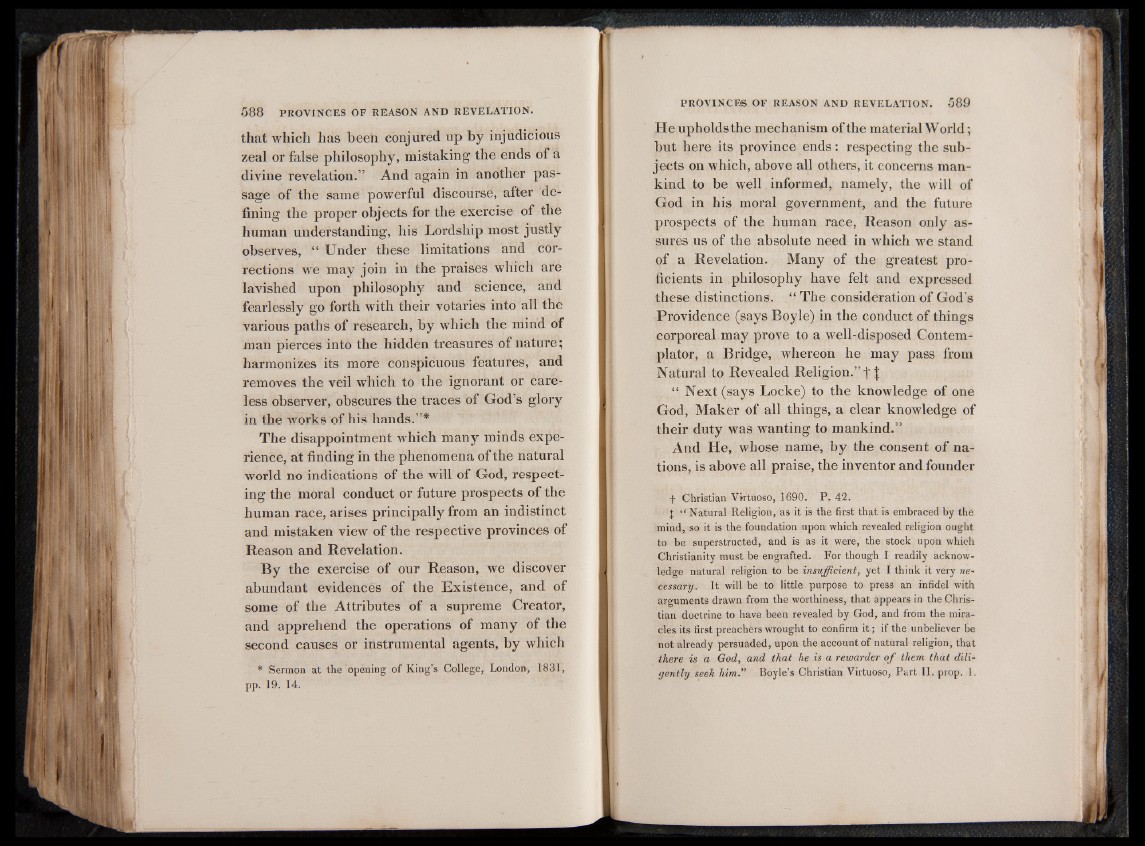
that which has been conjured up by injudicious
zeal or false philosophy, mistaking the ends of a
divine revelation.” And again in another passage
of the same powerful discourse, after defining
the proper objects for the exercise of the
human understanding, his Lordship most justly
observes, “ Under these limitations and corrections
we may join in the praises which are
lavished upon philosophy and science, and
fearlessly go forth with their votaries into all the
various paths of research, by which the mind of
man pierces into the hidden treasures of nature;
harmonizes its more conspicuous features, and
removes the veil which to the ignorant or carer
less observer, obscures the traces of God’s glory
in the works of his hands.”*
The disappointment which many minds experience,
at finding in the phenomena of the natural
world no indications of the will of God, respecting
the moral conduct or future prospects of the
human race, arises principally from ah indistinct
and mistaken view of the respective provinces of
Reason and Revelation.
By the exercise of our Reason, we discover
abundant evidences of the Existence, and of
some of the Attributes of a supreme Creator,
and apprehend the operations of many of the
second causes or instrumental agents, by which
* Sermon at the opening of King’s College, London, 1831,
pp. 19. 14.
PROVINCE'S OF REASON AND REVELATION. 589
He upholds the mechanism of the material World;
but here its province ends: respecting the subjects
on which, above all others, it concerns mankind
to be well informed, namely, the will of
God in his moral government, and the future
prospects of the human race, Reason only assures
us of the absolute need in which we stand
of a Revelation. Many of the greatest proficients
in philosophy have felt and expressed
these distinctions. “ The consideration of God’s
Providence (says Boyle) in the conduct of things
corporeal may prove to a well-disposed Contem-
plator, a Bridge, whereon he may pass from
Natural to Revealed Religion.” 1 1
“ Next (says Locke) to the knowledge of one
God, Maker of all things, a clear knowledge of
their duty was wanting to mankind.”
And He, whose name, by the consent of nations,
is above all praise, the inventor and founder
f Christian Virtuoso, 1690. P. 42.
I “ Natural Religion, as it is the first that is embraced by the
mind, so it is the foundation upon which revealed religion ought
to be superstructed, and is as it were, the stock upon which
Christianity must be engrafted. For though I readily acknowledge
natural religion to be insufficient, yet I think it very necessary.
It will be to little purpose to press an infidel with
arguments drawn from the worthiness, that appears in the Christian
doctrine to have been revealed by God, and from the miracles
its first preachers wrought to confirm i t ; if the unbeliever be
not already persuaded, upon the account of natural religion, that
there is a God, and that he is a rewarder o f them that diligently
seek him.” Boyle’s Christian Virtuoso, Part II. prop. 1.